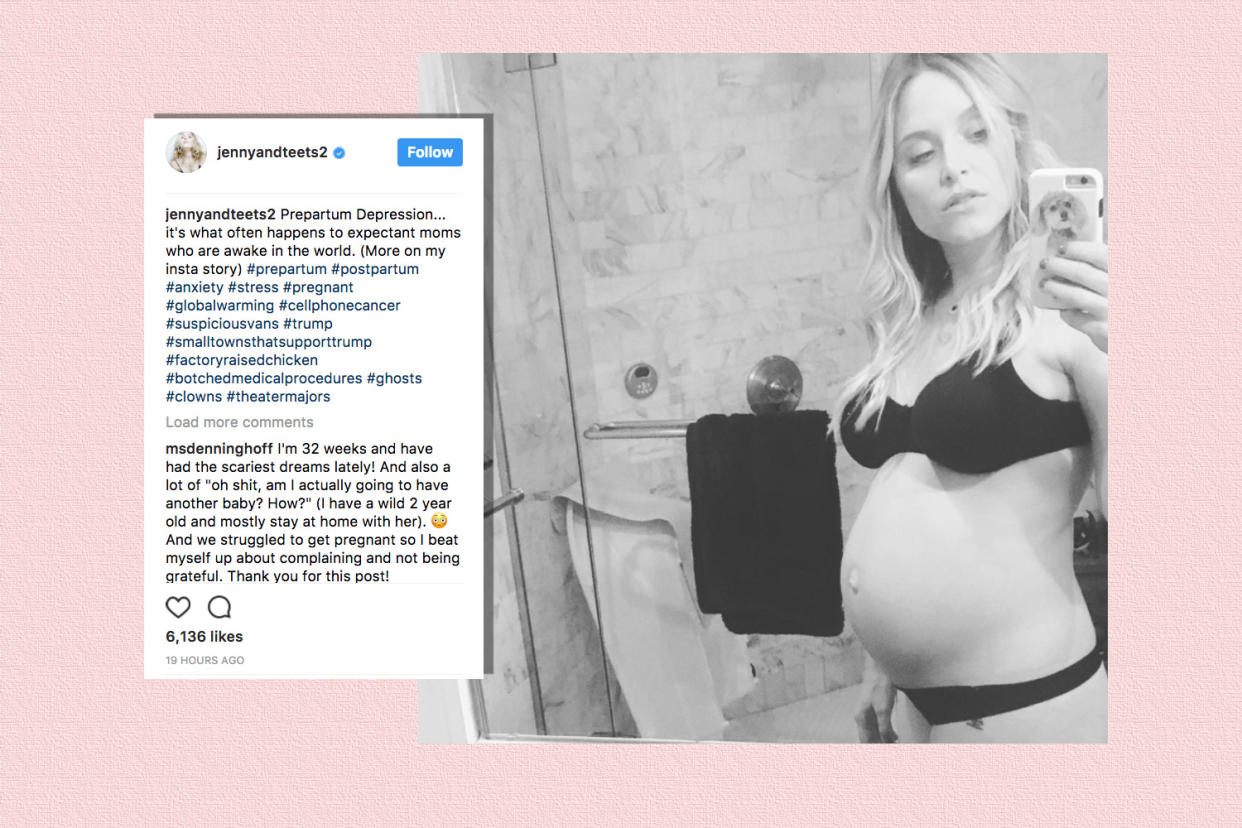Actress and writer Jenny Mollen shares candid post about prenatal depression

Actress and author Jenny Mollen has so far treated her second pregnancy with her signature humor. She’s posted nude selfies to show off her growing belly, and even shared a video husband Jason Biggs took of her as she experienced a bout of morning sickness on the street.
On Thursday, however, she got a little more serious about a topic she feels every mother needs to talk about: prenatal depression.
“I could already be in a depression; I’m sorry, but it’s true,” she said in an Instagram Stories video on Thursday. Mollen was in bed with a cold, she said, but also anticipating the mental state she experienced after giving birth to first child Sid three years ago. “I think that it’s chemical. I think that people don’t talk about it enough, so I guess I’m preparing myself now.”
A post shared by Jenny Mollen (@jennyandteets2) on Sep 7, 2017 at 10:43am PDT
While more people have recognized the existence of postpartum depression lately, not much is said about the fact that for some women — 14 percent to 23 percent, according to the American Congress of Obstetricians and Gynecologists — the mood disorder occurs during their pregnancy.
“I just want you to know whatever you’re feeling right now, like, if you’re waking up in the middle of the night with night terrors or dreaming about your dead dog or picturing your house on fire, that you’re not alone,” Mollen said. “It’s very normal.”
As with the postpartum disorder, prenatal depression is caused by hormonal changes as well as all the other factors bearing down on a mother-to-be, including worry about the unborn child and parenting. Compounding it all is the notion — enforced by practically everyone around a pregnant woman — that this should be the happiest moment of her life.
Earlier in her pregnancy, Mollen posted to Instagram about having placenta previa, in which the placenta covers the entire cervix, sometimes leading to bleeding. But the author of I Like You Just the Way I Am and Live Fast Die Hot knows that talking about mental health is difficult.
“You’ll be shocked how fast you can just wake up one day and be in the darkest place and think, ‘What’s wrong with me? I’m a new mom. I should be so happy. Everybody else is telling me how lucky and happy and amazing things are,'” Mollen said, recalling her postpartum depression after having Sid. “Don’t buy into that s***. If you feel bad, please get help.”
The U.S. Department of Health and Human Services’ Office on Women’s Health lists the most common signs of perinatal (pre- or post-) depression, which include feeling restless, crying a lot, having no energy, eating too little or too much, and losing interest in activities you used to enjoy. If these symptoms persist for more than two weeks, or you are having difficulty caring for yourself or your child, you should speak to your doctor right away.
Read more from Yahoo Beauty + Style:
8 plus-size influencers share advice on loving and accepting your body
Young woman opens up about her lupus battle with revealing selfies
Mom who beat cancer goes viral for epic exit from oncology wing
Follow us on Instagram, Facebook, and Pinterest for nonstop inspiration delivered fresh to your feed, every day. For Twitter updates, follow @YahooStyle and @YahooBeauty.

